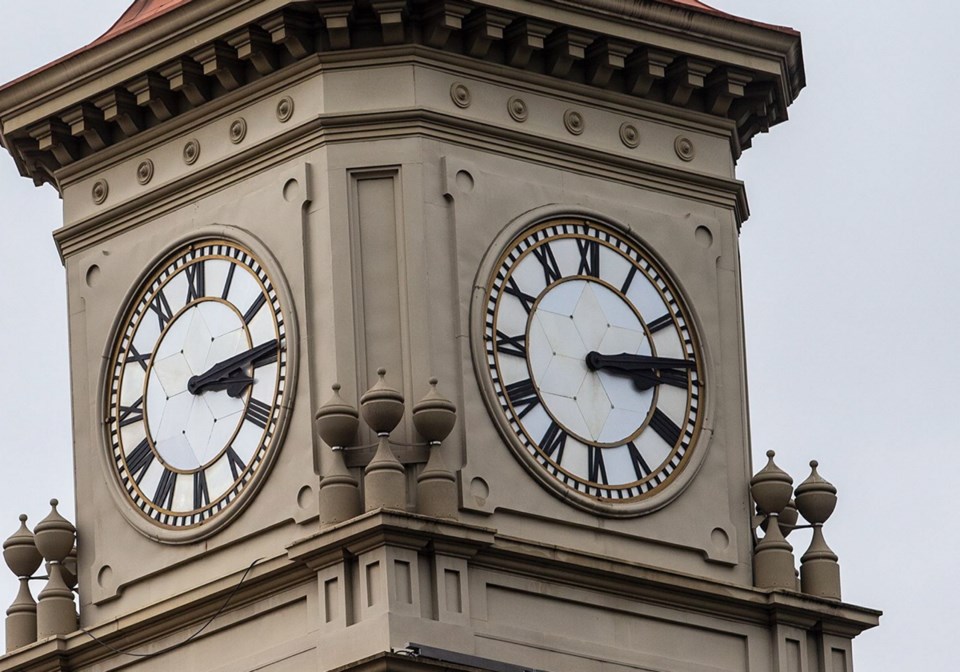To be fair, Premier John Horgan never actually promised we would scrap the time change by now.
No, in 2019 when B.C. passed legislation to do away with the twice-a-year clock adjustment, it was on the condition that we would only do so if our neighbours in Washington, California and Oregon were on board, too, and they’re not there yet.
Which is why, on Sunday, you will spring forward, again.
The question is, does the clock even matter anymore? Does the calendar? Quick quiz: What day is it? What month? If you replied Groundhog Day of Farchuary 2021, or possibly 2022, you are correct. As for the precise time, it doesn’t really matter now that you A) have Netflix and B) have taken to going to bed at 7 p.m. (the new midnight) and getting up only when the dog needs out.
Anyhoo, for those who are still fussed about the time change, Horgan offered an update at a news conference Friday. He said we still only want to move in sync with our American neighbours, as our economies are tied to theirs.
“We’ve heard loudly and clearly from industry, and others, that we should be in line with our southern partners,” he said.
The premier cited the examples of B.C.’s high-tech collaborating with Microsoft and other major companies in Washington state, and our entertainment industry meshing with California’s. “Some of the advantages of being in the same time zone as Hollywood means that our burgeoning film and television industry, which is making record productions at this point, needs to be on the same wavelength.”
As it is, the U.S. states can only switch to year-round daylight time — or Pacific Standard Time, as it would be called — with the approval of their federal government, which you might have noticed has been preoccupied with weightier matters for the past year.
Still, Horgan did dangle the prospect of action before the next clock adjustment comes on Nov. 7. “I am hopeful we will make progress before the fall when we would be scheduled to fall backward,” he said.
As it is, almost all of Canada will change its clocks Sunday (though the exceptions include those parts of B.C. where people are technically in this province but think of Alberta as their real dad). Fans of the measure — and there are many of them — like it because it means extra daylight after the workday, allowing us to spend summer evenings playing golf, or sitting on a pub patio or, according to certain family members, rototilling the garden. (Certain family members are wrong.)
Opponents dislike tomorrow’s shift because we lose an hour right now. Everyone prefers the one that comes in the fall, where we’re gifted an extra hour’s sleep (unless you work in a bar and have to put in an extra hour after the clocks roll back at 2 a.m.). This week’s switch would be far more palatable if the clocks changed not in the wee hours on a weekend but the middle of, say, a Wednesday afternoon, jumping from 3 p.m. to 4 p.m. and allowing us to go home early.
The serious opposition to time changes has to do with the impact of unnecessary disruptions. Studies link the constant clock-shifting to heart attacks and bleary-eyed car crashes. Electronic timers don’t always adjust. Farmers grumble that livestock refuse to change their internal clocks whenever the authorities tell them to (note to self: wristwatches for chickens).
So, why do we spring forward? Blame (or credit) England’s William Willett, who in 1907 published a pamphlet titled The Waste of Daylight. He was generally smirked at until 1916, when both sides in the First World War adopted daylight time as an energy-saving measure. This would have been terrifically satisfying for Willett had he not died (or fallen back) in 1915. (BTW, Willett is known not only as the father of daylight time but the great-great-grandfather of Coldplay’s Chris Martin, who sang the song Clocks, which seems appropriate.)
All of which is neither here nor there as we bide our time.
“For now,” Horgan said, “my message to British Columbians is we’re springing forward, change the batteries on your smoke alarms and enjoy the spring and summer ahead.”



